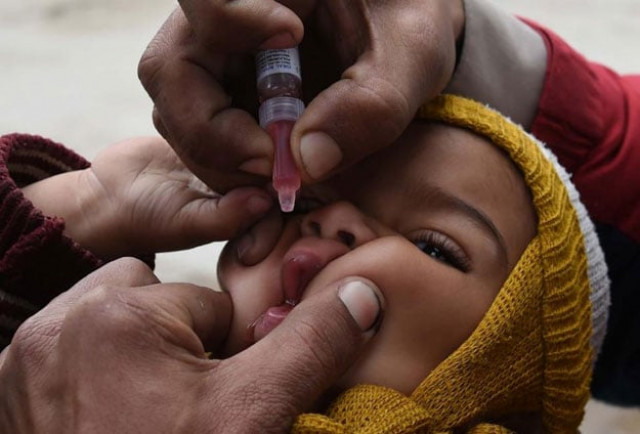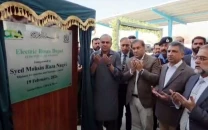Landmark achievement: Govt launches injectable vaccine to combat polio
More than four million children will benefit from the vaccine which will be incorporated into immunisation schedule

More than four million children will benefit from the inactivated polio vaccine (IPV), which will be incorporated into the country's routine immunisation schedule and given to children alongside other jabs. PHOTO: AFP
According to the World Health organization (WHO) more than four million children in Pakistan will benefit from IPV every year. The vaccine, part of the government’s regular immunization programme, will be administered to children between 14 weeks and two years of age alongside the third dose of OPV, pentavalent vaccine - which protects against diphtheria, tetanus, pertussis, hepatitis B and Hib - and pneumococcal vaccine.
“We are confident that this introduction will give a boost to Routine Immunization in the country,” said Minister of State Ministry of National Health Services Regulation and Coordination Saira Afzal Tarar, while addressing at the launching ceremony. She added that they were aiming to intercept the virus by 2016.
The IPV is being introduced under the Expanded Programme on Immunisation (EPI) as part of the Polio Eradication and Endgame Strategic Plan 2013–2018—the comprehensive long-term strategy developed by Global Polio Eradication Initiative to help eradicate the virus by 2018.
Dr Rana Safdar, in-charge of the National Emergency Operation Cell for Polio told The Express Tribune that they had been trying to incorporate the IPV in their routine immunization programme since December 2013. By April 2014, they had submitted a formal application to the Global Alliance for Vaccines and Immunisation (GAVI), requesting financial support for the introduction of IPV.
“Being an underdeveloped country, it was not possible for Pakistan to bear the high cost of (manufacturing) IPV and also assure its availability across the country,” he said.
That application was approved in September 2014 and it was decided that IPV would be launched in July 2015. However, the programme faced delays and the deadline was missed.
“GAVI has provided a package which includes vaccine, syringes, equipment to maintain cold chain among other essential things which will last for two years till July 2017,” he said.
Dr Safdar stressed that three doses of oral polio vaccine (OPV) along with one dose of IPV will boost measures against the disease. Pakistan has so far reported 29 cases of polio this year, down from 115 at this time last year. However, it still accounts for over 80% of all polio cases reported world wide in 2015.
“If we want to stop children from being disabled by this scourge and eliminate polio, we need to reach each and every one of them with a strong routine programme and robust health systems,” Gavi CEO Dr Seth Berkley said.
“Gavi fully supports Pakistan in its work towards a polio-free future as the first half of 2015 marks the lowest number of polio cases ever.”
Last year the number of polio cases recorded in Pakistan soared to 306, the highest in 14 years.
Read: Polio Vaccination : New vaccine for high-risk areas
One of the major obstacles to immunisation in Pakistan has been attacks by militants on health workers. However, the military operation launched last year against militant groups in North Waziristan forced millions of civilians to leave their homes and settle in other districts. All those fleeing North Waziristan were given polio drops as they entered Khyber-Pakhtunkhwa province, allowing health workers a chance to reach families who had not been vaccinated for years.
Tarar said the military offensive had had a major impact.
"Miracles are happening after this (military) operation. Kids who were inaccessible are now coming to us," she told the gathering which was attended by UNICEF, WHO and senior health officials.



















COMMENTS
Comments are moderated and generally will be posted if they are on-topic and not abusive.
For more information, please see our Comments FAQ